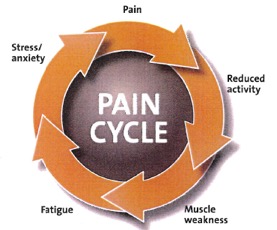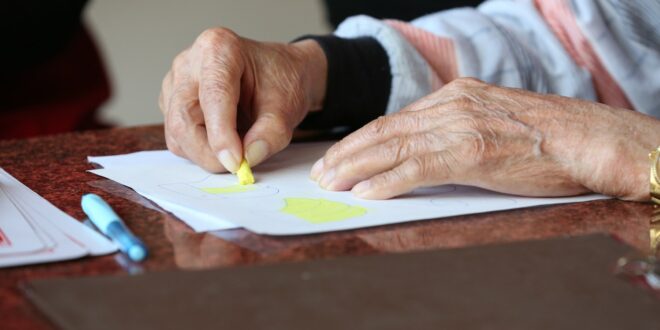We sometimes hear people say they have, just a bit of arthritis, but if you’re living with the condition, you will know how painful and unpredictable it can be.
Living with pain can be the hardest part of arthritis. It’s easy to start avoiding activities because they’re painful. You may start losing confidence and feel you are not able to live a healthy life.
Pain can be complex, whether it’s acute or chronic. Short term acute pain is very useful – it’s a signal you need to protect whatever part of your body is hurting. Chronic pain lasting longer than three months does not always mean harm. Often it’s the brain overprotecting us.
Scientists have found the degree of pain does not necessarily relate to the severity of injury or joint damage, arthritis is no exception! We also know pain, stress, fatigue or depression will often make your pain worse.
 This is known as the pain cycle. The good news is it can be broken.
This is known as the pain cycle. The good news is it can be broken.
What can we do to manage pain?
- Gentle, low impact exercise and stretching
- A healthy diet and maintaining a healthy weight
- Joint protection, including using devices such as walking sticks and supportive cushioned footwear
- Mind-based approaches (deep breathing, relaxation, mindfulness, distraction)
- Stress relief: pace yourself, prioritise, plan, watch your posture
- Medications and supplements
- Applying heat or cold – whichever brings relief
- Topical creams and gels.
The Four P’s
- Pace yourself: Do you tend to overexert yourself when you feel good then have to rest up afterward? Pacing involves adopting a “little and often” approach instead of tackling activities all at once. It’s important to know your limits or set a timer, switch tasks frequently, and take regular breaks. Just because you’re having a good day, doesn’t mean you should push yourself and try to do more.
- Plan effectively: Take the time to determine what needs to be accomplished each day or week, but remember to remain flexible. Plan designated rest times, break down tasks into smaller segments, and identify tasks that can be delegated to others.
- Prioritise wisely: Establish realistic goals and avoid being too hard on yourself. Differentiate between what must be done today, what could be done today, and what you would like to do, but isn’t essential. Learn to say no when necessary and don’t hesitate to seek help when needed.
- Mind your posture: Poor posture contributes to increased fatigue, while good posture safeguards your joints and reduces muscle tension. Stay mindful of your body’s position and avoid prolonged static postures. Keep yourself in motion!
Everybody is different, so be prepared to try different self-management techniques until you find what works best for you. Pain may limit your lifestyle but it doesn’t have to control your life.
For more information and support, phone Arthritis New Zealand 0800 663 463.








Rottiegirl - 2 years ago
With Sooooo many supplements out there for muscle and joint pain, what is the one that has really worked for people? You could spend a fortune,.